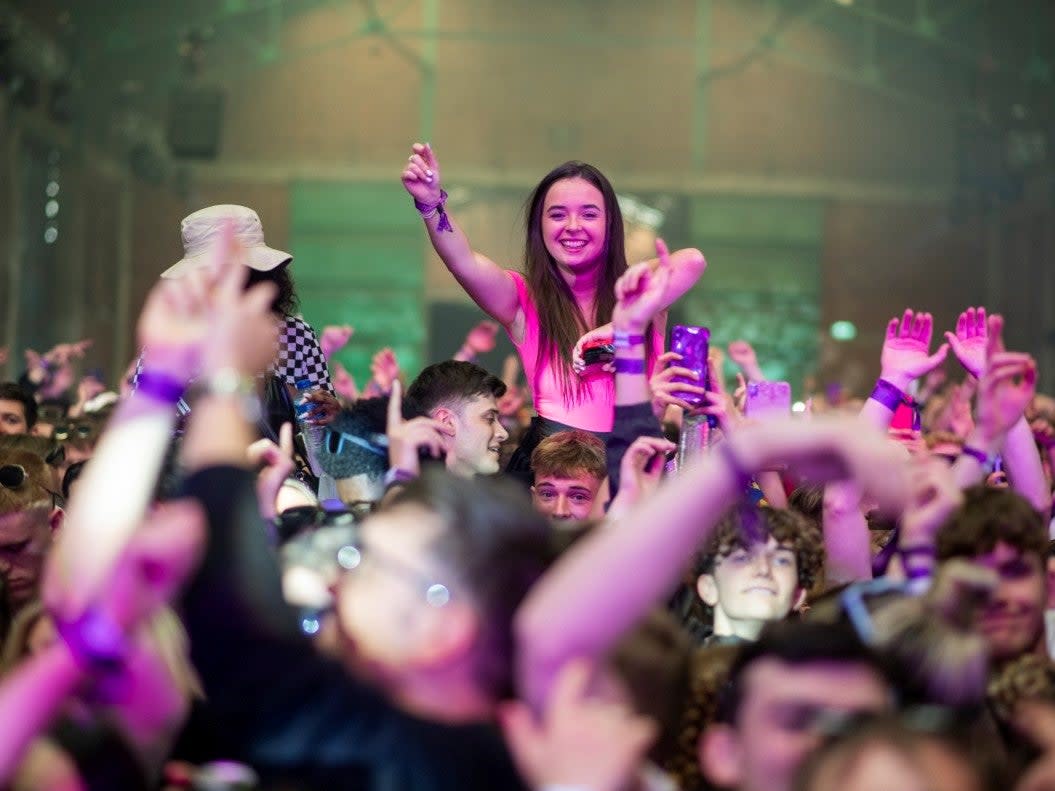Why I’m fighting for gender equality and representation in dance and electronic music

‘My hope is that one day we don’t need these conversations or initiatives’
(Getty Images)You can’t be what you can’t see. I’ve learnt this in my career so far. Visibility of different types of people is essential for creating a diverse, colourful and equal world. Without role models how can you feel inspired to achieve your dreams?
I remember filling out a careers survey at school, writing down that I wanted to help people. Suggestions to be a doctor or teacher came up, but they weren’t quite right. A career in music wasn’t in mind. If you had told me then that I would be DJing to crowds of people and hosting my own show on BBC Radio 1, as a job, I would have never believed you. Why? Because back then, a “DJ” was Calvin Harris. It was David Guetta, it was The Chemical Brothers, it was a man’s thing.
No disrespect to these iconic members of the dance community, but they were never going to inspire a young mixed-race girl from a tiny island in The Channel Islands to follow a career in music. The door remained locked until I saw women doing these jobs, and then the lightbulb flickered.
I never knew that DJing and radio presenting could be my job, because I’d never seen people like me doing it before. The day I heard Annie Mac on the radio playing house music I felt inspired. All it takes is for one person to welcome you in and make you realise your true potential.
I’m fortunate to have female role models: The Blessed Madonna, Clara Amfo and Jamz Supernova, and I’m so grateful that they showed me what’s possible. Through seeing them, I had the confidence to join uni radio, play around with some decks and start mixing. I felt seen, I felt heard, and that was all I needed.
I mention the careers survey because I’ve somehow ended up doing the job that’s right for me. I help people every day, by giving artists opportunities to shine on the radio, and giving people a leg up when it comes to working in music.
I wanted to do more to tackle gender inequality in dance music, so I decided to launch Future1000. I’m proud to have teamed up with in school music education platform FutureDJs to discover 1,000 young girls and transgender and non-binary people from schools across the country, to take part in a DJ, production and leadership programme.
Joining forces with FutureDJs, which has already been doing amazing work modernising music education in schools, has allowed us to combine our expertise to create a genuinely inclusive space for students of all backgrounds. At school, the pressure to know what you want to do is really daunting, so we targeted the initiative to students under 18 to help give them confidence to follow their curiosities and try something new.
When I read that women make up just 2.6 per cent of producers, 21.6 per cent of all artists (with a low of around 16 per cent in 2017) and 12.6 per cent of all songwriters, I knew I had to act. I am lucky to have female DJ friends to vent with about shared experiences of misogyny and sexism: from male promoters not believing that you, a woman, are the DJ, to people accusing you of not writing your own music, to being actually groped (by a man) while playing a set.
There’s certainly a double standard when it comes to how men and women are treated behind the decks, and I am here to eradicate that and bring those figures closer to 50 per cent.
This year I decided to set up The Jaguar Foundation – a home for my long-term commitment to equalise music through more forward-thinking initiatives and partnerships, which will create opportunities for women and minority groups such as the LGBTQ+ community and people of colour.
I’m delighted to be partnering with Ministry Of Sound and Sony Music’s Social Justice Fund (committed to supporting initiatives and educational opportunities in underserved communities) to launch my foundation. Their investment in The Jaguar Foundation will help support my role in Future1000 and other initiatives and I can’t wait to see what we will achieve together.
Last year when the world stood still, I found my voice. By disconnecting from the buzzy music world of noise and excitement, I adapted my craft in a new direction.
Experiencing the Black Lives Matter movement in the wake of the tragic murder of George Floyd made me understand the importance of calling out injustices, and extending a hand to minorities who are misrepresented in the world. By stopping, by looking inwards, I realised how much I could change for the better.
My hope is that one day we don’t need these conversations or initiatives. I’m aiming for utopia, and the way to get there is through solidarity. I am hopeful and I’m ready to work. Are you?
Jaguar Bingham is the host of the BBC Introducing... Dance programme on Radio 1. Find out more about the Future1000 project here
Read More
Labour faces a huge challenge – a few quick decisions won’t change that

 Yahoo Movies
Yahoo Movies 
